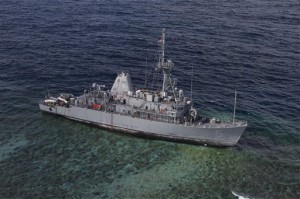PH urges US to pay for Tubbataha damage
MANILA, Philippines–The Department of Foreign Affairs (DFA) said Wednesday it would continue to pursue its talks with the United States in getting full compensation for the damage that a US Navy ship caused when it ran aground on Tubbataha Reefs Natural Park last year.
The DFA issued the statement a day after the Supreme Court issued a ruling that the United States should be held liable for the damage.
It said it was taking note of the Supreme Court ruling on the case filed by bishops, militant groups and environmentalists on the grounding of the USS Guardian, a US Navy minesweeper, on the Unesco World Heritage site on Jan. 17, 2013.
The high court, however, denied the petitioners’ bid for the issuance of a writ of kalikasan (nature) that would hold Philippine and American officials, including three military US officials, liable for administrative, civil and criminal suits for the incident that damaged more than 2,000 square meters of reefs.
The writ of kalikasan is a legal remedy for people whose constitutional right to a balanced and healthy ecology is violated by an unlawful act or omission of a public official, employee, or private individual or entity.
The Supreme Court said it lacked jurisdiction over the case as it was against the United States itself, noting that states are protected from suit under the principle of sovereign immunity.
It’s up to executive branch
But the Supreme Court ruled that the United States must be answerable for the damage to the reef park in keeping with Article 31 of the United Nations Convention on the Law of the Sea (Unclos) even if it was not a party to the treaty.
While the high court pushed for the US to honor obligations under Unclos, the tribunal said it could not grant damages through the writ of kalikasan because such claim should be “made in a separate civil suit” or through criminal action according to the rules on environmental protection and the writ itself.
But the high court left the matter of compensation and rehabilitation to the executive branch, given the ongoing claims process through diplomatic channels.
Ongoing discussions
“We will continue our ongoing discussions with the US government on the matter of securing full compensation for the damage to the Tubbataha Reef, and will be guided by the Supreme Court decision and the advice of the Solicitor General,” the DFA said in a statement.
The DFA also said it would continue to work with government agencies to ensure “navigational safety in the area” as well as the preservation of the reef and its marine environment.
The high court decision came a day after US Ambassador to the Philippines Philip Goldberg said that the US Embassy would make an announcement “very soon” on compensation for the damage wrought on Tubbataha Reef by the US Navy minesweeper.
Goldberg said the embassy was in the last phases of review of the damage claim by the Philippines.
The government has fined the United States P58 million for the damage to the reefs.
It took US authorities 73 days to dismantle the ship and completely remove it from the reef.
Just pay up
The United States should just pay up for the damage it wreaked on the Tubbataha Reef and should not use as an excuse the fact that it was not a party to the Unclos, according to Sen. Miriam Defensor-Santiago.
Santiago, an international law expert, also said that in some cases, even if a state was not a party to a treaty, it could be bound by that treaty under a provision in the Vienna Convention on the law of treaties.
According to Santiago, international environmental law that provides that you pay for your damage to the environment, whether done accidentally or not, is “jus cogens,” meaning a peremptory rule of international law.
“So, the US government cannot use the excuse that it is not party to the Unclos. That’s an ugly position for the US who pretends it is a champion or advocate of international environmental law,” she said.
“They should just voluntarily offer to pay… because they destroyed part of the Tubbataha Reef,” she added.
Criminal case
Santiago said the petitioners who had filed a case in the Supreme Court should also file a criminal or civil action, or a tort case against the US.
She said the high court was correct in its ruling on the petition concerning the damage to the Tubbataha Reef, caused by the grounding of a US Navy minesweeper.
The militant umbrella group, Bagong Alyansang Makabayan (Bayan), meanwhile, said the United States should make good on its promise to pay compensation to the Philippines.
“We continue to press the US government to be accountable for the damage, including paying compensation,” said Bayan secretary general Renato Reyes Jr.
Awaiting a copy of the Supreme Court’s full decision, Reyes said Bayan and the other petitioners, including bishops, environmentalists, lawyers and activists, were set to meet next week to discuss their possible legal recourse.–Reports from Christine O. Avendaño, Leila B. Salaverria and Tarra Quismundo
RELATED STORY
US should volunteer to pay damages on Tubbataha Reefs—Santiago

